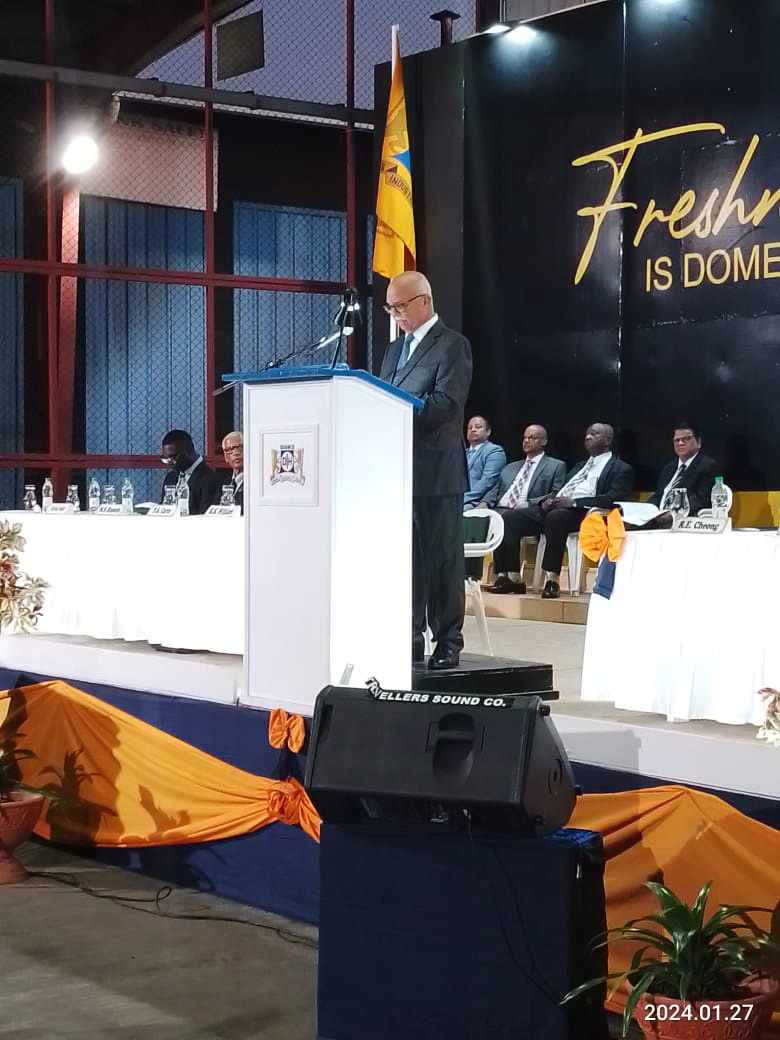By Antonio Dey
Chairman of Banks DIH, Clifford Reis yesterday disclosed that there was a shortage of Banks Beer on the market during last December due to technical issues with a bottling plant.
As such, he announced at the food and beverage company’s 68th Annual General Meeting held at Thirst Park, Ruimveldt, Georgetown, that a sum of US$21 million had been approved by the board of directors for the development of a new beer bottling plant.
Reis, who has been Banks DIH chairman since the death of founder, Peter D’Aguiar in 1989, said that last Decem-ber, due to technical issues with the beer bottling plant, approximately 150,000 cases of beer were off the local market.
Consequently, Christmas sales were affected and the Chairman decided to find innovative solutions to keep the product on the local market.
He said in February 2023, the beer plant was expected to undergo an audit, but there were supply chain issues, and the company following its inspection of the equipment in September realised that it did require additional spares.
Though the spares were scheduled to arrive last year, Reis informed this did not happen, which prompted the company to devise a new strategy of building a new plant.
He recounted that during December, plant operators worked overtime just to keep the wheels of production turning since many persons enjoy this beverage during the festive season.
Reis also reported that the new brewery facility is expected to produce 800,000 cases of beer per month.
The Banks DIH chairman also stated that the new carbon dioxide plant is expected to run at a capacity of 500 kilograms per hour (kg/h).
There were reports on social media about the shortage of the company’s premier beer – Banks – leading to price increases. The company had not issued a statement on it.
Turning his attention to the company’s export sales for the financial year 2023, Reis reported that over 593,000 units of products were sold at a value of US$4.7 million.
Stabroek News reported on January 22 of this year, that the company registered a net profit of $8.970 billion last year, up 6% from 2022.
“The overall performance of the group improved by recording a profit before tax of $14.5 billion compared to $13.398 billion in 2022, an increase of $1.11 billion or 8.29%. Profit after tax for the group attributed to shareholders of the parent company increased from $8.395 billion to $8.970 billion, an increase of $575 million or 6.8%,” Reis stated in his report for 2023.
“Revenue generated by the company was $44 billion, compared to $39 billion for 2022, an increase of $4.395 billion or 11.1%. The profit before tax for the company was $11.3 billion compared to $10.5 billion achieved in 2022, an increase of $887.0 million or 8.4%, while the profit after tax increased from $7.589 billion to $8.19 billion by $540 million or 7.1%,” the report added.
Reis said that the Board of Directors of the company has recommended “a dividend proposal of $2.50 per share unit,” resulting in an overall cost of $1.8 billion, as compared with $1.7 billion in 2022. The increase amounts to $170 million or 10%.
“The Board of Directors declared a first dividend of $0.45 per share unit, which was paid on May 18, 2023. A second interim dividend of $0.45 was also paid on October 26, 2023, and now the Board of Directors recommend a final dividend of $1.30 per share unit, making the overall dividend per share unit $2.20 or an overall cost of $1.870 billion, an increase of $170 million or 10% over the previous year,” Reis said.
One shareholder at the AGM yesterday suggested that the dividends be increased as what she is receiving currently is unacceptable and paltry.
The Chairman’s Report pointed out that the financial year, which ended on September 30, 2023, had many challenges which included supply chain delays and increases for raw and packaging material, spares, energy, distribution and retention of skilled employees.
But he noted that the company’s strategy focused on its employees and customers to “drive sustainable solutions and build resilience” in its manufacturing processes, maintaining the production of high-quality products and efficiency in operations.
As it relates to capital expenditure, the report said that Banks DIH continues to make “capital investments in plant, machinery and equipment to strengthen long-term development, bolster its manufacturing capacity and improve operational efficiency.”





